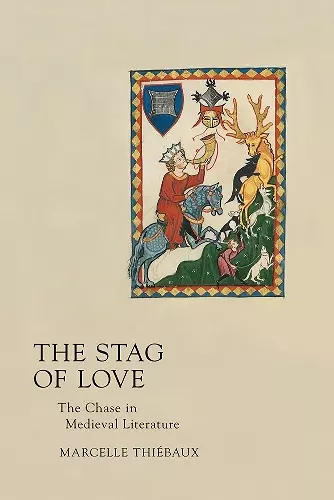Stag of Love
The Chase in Medieval Literature
Format:Hardback
Publisher:Cornell University Press
Published:1st Jan '74
Currently unavailable, and unfortunately no date known when it will be back
This hardback is available in another edition too:
- Paperback£26.99(9780801479694)

This insightful exploration reveals how the hunt metaphorically parallels the pursuit of love, as articulated in Stag of Love, enriching our understanding of medieval literature.
The book Stag of Love delves into the rich tapestry of erotic metaphor that emerged in medieval literature and art, particularly influenced by the works of Ovid. The concept of hunting, as both a sport and a military exercise, is examined for its aggressive nature and its symbolic representation of sexual desire. This exploration reveals how the hunt, with its inherent violence, parallels the pursuit of love and the strategies involved in romantic endeavors. Through vivid imagery, the text captures the essence of love's joys and its mystique, while illustrating the connections between the hunt and the literature of love that flourished during this period.
Marcelle Thiébaux begins her analysis with a detailed account of medieval hunting practices and their ceremonial aspects. She introduces various hunting manuals that not only defined the sport but also shaped narrative structures in literature. The stages of the hunt, from preparation to the climax of the chase, are mirrored in the pursuit of love, highlighting the confrontation with the beloved and the eventual consummation. Through her examination of works such as Beowulf, Sir Gawain and the Green Knight, and Chaucer's poetry, Thiébaux illustrates the enduring themes of desire and pursuit.
Originally published in 1974, Stag of Love has been reissued in paperback, making it accessible to a new generation of readers. The book offers invaluable insights into the imaginative portrayal of love throughout the Western literary tradition, engaging both medievalists and anyone fascinated by the complexities of romantic relationships.
The Stag of Love is an unusually imaginative, thought-provoking, eminently readable book which all medievalists will surely enjoy.
* Modern Language Review *Hunting supplied medieval writers with a rich fund of words, images, allegorical motifs, and narrative patterns, and it is therefore important that we should be alerted to respond to its influences in imaginative writing. It is the ambition of the present book by Marcelle Thiébaux to provide such access and stimulate such alertness. It is an ambition admirably conceived and splendidly fulfilled.
* Review of English Studies *This book serves as a useful reminder of another of the forgotten languages of medieval literature. At a time when hunting was a principal occupation of the aristocracy, we are not surprised that its terms and figures were used to express other forms of activity, just as today the language of sport, for instance, has come to be used to express a variety of formal and intimate relationships. We are generally aware that medieval writing is pervaded by terms from hawking and hunting, and that hunting episodes play an important part in the chronicles and romances, and sometimes in lyric poetry and moralistic prose. The Stag of Love appears to be the first attempt systematically to bring this material together and arrange it into coherent conceptual patterns.
* SpeculISBN: 9780801407925
Dimensions: 229mm x 152mm x 24mm
Weight: 907g
250 pages